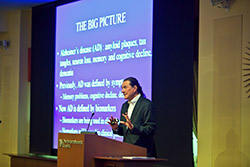
As the sixth leading cause of death in the United States, it is no wonder that Alzheimer’s disease is a major topic of concern for many. Fortunately, scientists are making many advances to ensure that someday there will be a cure for it.
Some of those investigators recently gathered at the 20th Annual Alzheimer Day at Northwestern University Feinberg School of Medicine to showcase recent research and host internationally known experts in the field.
“Collaborative interdisciplinary research is key to advancing medical knowledge, and the Cognitive Neurology and Alzheimer’s Disease Center (CNADC) is a wonderful example of successful multi-departmental research,” said Eric G. Neilson, MD, vice president for Medical Affairs and Lewis Landsberg Dean. “This type of collaboration is the cornerstone of Northwestern Medicine.”
Marsel Mesulam, MD, CNADC director and organizer of the event, welcomed guests and thanked the many individuals involved in making the CNADC’s successes possible over the last twenty years.
“In these past 20 years the very small core faculty of the CNADC has brought in close to $60 million in funding for the medical school,” said Mesulam. “The center has also published almost 1,000 papers describing new clinical science and discoveries. I think one the most impressive statistics comes from the clinical arm of our center, where we’ve seen 33,000 patients. These statistics reflect the work of a wonderful coalition.”
Keynote speaker Michael Weiner, MD, professor in residence of the Department of Radiology and Biomedical Imaging at the University of California-San Francisco School of Medicine, also discussed some of the major initiatives in the field.

Weiner shared information on several projects he is collaborating on, including the Alzheimer’s Disease Neuroimaging Initiative (ADNI), a major collaboration with many universities and investigators across the world.
“ADNI works to encourage investigation by making all data available without embargo,” said Weiner. “We think this is a really important model so that all scientists can use and take advantage of the data.”
He also shared information on a website database he is involved in called Brain Health Registry. The project is working to create a feasible way to track patient health through an online database.
After the keynote address, many attendees expressed their gratitude to Weiner for his dedication to finding a cure for the disease.
The event also featured a program called, “Don’t Look Away: Using Storytelling to Give Voice, Find Connections, and Change Perceptions,” where several couples dealing with Alzheimer’s disease shared their story with the audience.
Jean and Daniel Winship were one of the couples; they took turns sharing memories leading up to Dan’s, a former gastroenterologist, diagnosis in 2011.
At the end of the presentation, the couple shared a final thought with the audience:
“We are here today because we don’t want the next generation to have to sit in a neurologist’s office and have the first thought be helplessness. With your support, those who have dementia can live better lives. We know that someday scientists will find a way to prevent and cure Alzheimer’s.”






